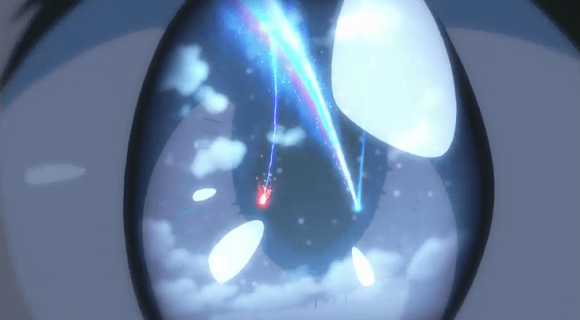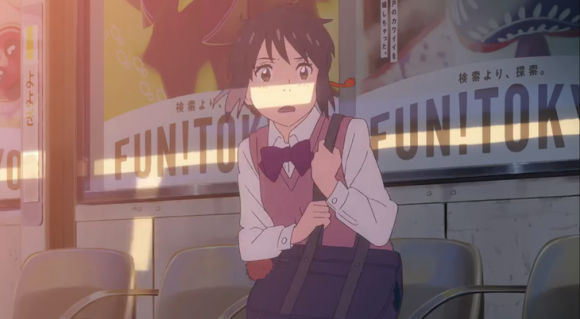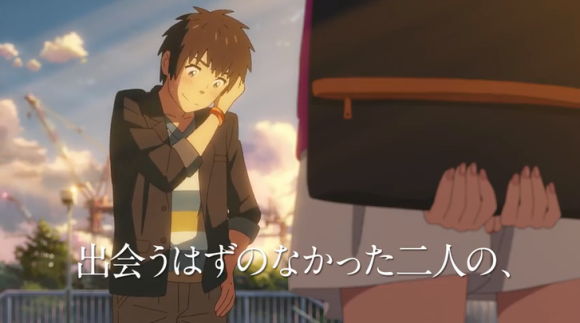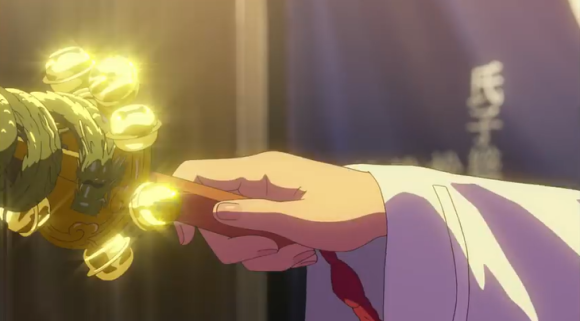
All the things anime fans have come to expect from the acclaimed director are present and accounted for, but is that enough?
There’s a scene in director Makoto Shinkai’s new theatrical anime, Your Name, which serves as a pretty good litmus test for how much you’re likely to enjoy the movie. The male and female leads, in their separate hometowns, look up to watch a shooting star streak across the night sky, leaving a tail of light as it flies across the heavens.
Astronomy enthusiasts in Japan have pointed out that the depiction of the meteor isn’t completely congruent with real-world science. All the same, it looks utterly gorgeous and produces an immediate, almost magically sentimental effect. It’s the most compactly crystalized example of the film being led by its heart instead of its head, and if that decision works for you, you’re likely to come away happy to have seen Your Name.
While the director has been routinely celebrated by anime fans both in Japan and abroad, Your Name got an unprecedented amount of mainstream domestic press coverage for a Shinkai film. Fittingly, the script is confident enough to trust moviegoers already know the basic premise: high school students Mitsuha and Taki, living in rural Gifu Prefecture and Tokyo, respectively, mysteriously begin to switch bodies when they fall asleep. As such, te movie wastes no time getting straight into the conscious-swapped scenes, which are described as “Happening a few times a week, with no particular pattern,” which lets the convention be used as often or infrequently as is convenient for the scenes Your Name wants to show the audience.
For the most part, Mitsuha and Taki take the supernatural phenomena in stride. Taki learns to appreciate the natural beauty of Mitsuha’s hometown and the traditions of the shrine her family administers, while Mitsuha takes full advantage of the proximity to Tokyo’s trendy cafes and fashionable entertainment districts that come with borrowing Taki’s life. But while it’s a refreshing change to see characters in this sort of situation not immediately go to pieces, during this section of the movie one of Your Name’s major weak points is exposed.
After a few extended scenes establishing the body-switching mechanic, the movie drops in a montage of Taki and Mitsuha going about each other’s daily life. On the upside, it’s set to an incredibly catchy song by Japanese rock band Radwimps.
At the same time, though, it doesn’t really do much to establish who the characters are. If you’ve seen the trailer for Your Name, it’s clear that the emotional beats hinge on the growing intimacy between its two leads, and the question of whether or not it’s the basis for a lasting interpersonal, or possibly romantic, relationship. Montaging so much of that process makes it feel like their connection forms simply because of a passage of time, as opposed to admiration or attraction, because it glosses over so much detail.
Making things more difficult is that the nature of the story means we don’t see Mitsuha and Taki interacting with each other. Sure, they leave notes, scrawled both in notebooks and on body parts as well as entered into their mobile phones. For most of the film, though, when we see one character’s body doing something admirable, it’s the other character’s soul inside. It’s particularly tough to understand what draws Taki to Mitsuha. Whereas the story establishes Taki as an earnest, friendly guy who works hard at his part-time job and hopes to become an architect, Mitsuha spends the majority of her screen time in her own body either loudly complaining about how boring her town is or quietly complaining about having to help out with the shrine.
Even when they swap bodies, we can see Taki, to an extent, trying to make positive contributions to Mitsuha’s life. He stands up to a group of would-be bullies targeting her and tries to make her town just a little more enjoyable for someone dreaming of a cosmopolitan life. Meanwhile, Mitsuha eats fancy desserts and pursues an attractive coworker of Taki’s, a romantic quest she seems to find much more fun than he does.
There’s also a major third-act plot twist that’s likely to take the audience by surprise, but which the characters it affects should have seen coming a mile away. While it feeds into the rest of the story, after this suddenly introduced crisis is resolved the movie spins its wheels for another ten minutes or so before finally heading into conclusively resolving whether or not Taki and Mitsuha will have any sort of continuing connection.
And yet, despite the fuzzy motivations linking one scene to the next, many of them are extremely well-done when judged as individual moments. Somewhat like the comet hurtling across the anime’s sky, the audio and visuals are always moving toward some strong sentiment, whether it’s elation, melancholy, apprehension, or reverence.
The film is a near-constant joy to look at. No one in the animation industry produces environmental art like Shinkai does, and the background of almost every scene is dripping with color and emotion. It’s not just Gifu that looks breathtaking, but Tokyo as well, with some beautiful renderings of Tokyo’s urban Shinjuku district on display. On that note, it’s nice to see Your Name elegantly sidestep the cliche of “rural life good, big city life bad,” as Mitsuha’s enthusiasm for the Tokyo lifestyle is presented as a completely valid opinion.
While not as jaw-dropping as the backgrounds, the character animation also shines in spots. While Mitsuha isn’t too keen on performing a shrine dance at her grandmother’s insistence, the audience will be glad that granny got her way, because the stunning movements of the ritual are an artistic highlight of the movie. As with many stand-alone theatrical anime, the voice-acting is more subdued than what you’ll hear in a typical Japanese animated TV series, but still lands in a more emotive space than a Ghibli or Mamoru Hosoda feature.
For a movie in which connecting threads are such a visual and figurative theme (Mitsuha’s shrine duties include weaving ceremonial braids, and the name of her fictional hometown, Itomori, literally means “string protection”), it’s sort of a shame that the seams tying together Your Name’s plot points aren’t more tightly sewn. Part of that might be due to the film’s running time. At 106 minutes, it’s not excessively long, but it’s only the third anime of 90 minutes or more by Shinkai, whose breakout work was the 25-minute Voices of a Distant Star and whose last project was The Garden of Words, which clocked in at just 46 minutes. With that in mind, it’s not entirely unreasonable to think that he might still be refining his personal style of piecing together the story for an anime of this length.
As a very hands-on creator, Shinkai also wrote and edited Your Name, and it’s possible that a different editor might have removed the musical montage and trimmed the late lull before the ultimate climax, freeing up a bit more space to devote to developing Taki and Mitsuha’s characters in a more detailed manner. That, in turn, would have helped make it a little more logical just what, other than pure familiarity, sparks their deeper interest in one another.
That said, none of these issues seem to be hurting Your Name at the box office or in the eyes of Japanese viewers, who’ve made it a smash hit. At the screening I attended, the theatergoer next to me was sobbing right along with the on-screen characters during especially moving scenes, which leads to what’s arguably the movie’s greatest strength.
While the motivations connecting one scene to another are often fuzzy, it’s always clear what Your Name believes its characters are feeling, and the characters’ actions in any individual scene show that they, at that instant, believe it too. They believe it so strongly that, at the story’s most important points, they can make you believe it too.
All of which brings us back to that comet, which shouldn’t really look as awesomely beautiful as it does. It’s tempting to label a movie “dumb” if you’ll get the most out of it by watching without thinking about the details too hard, but that would be an unduly harsh way of judging Your Name. The more apt description would be to call it a young movie. Your Name is filled with the sort of emotional conviction felt by teens and young adults who know exactly what they feel, even if they don’t entirely know why, and the movie is in no way embarrassed about that being its driving force.
If that’s a mindset you can appreciate, either because it’s the one you have now or you remember it being a strong, positive force in your past, Your Name will hit you right in the heart.
Related: Your Name official website
Images: YouTube/東宝MOVIEチャンネル
Follow Casey on Twitter, where he’d like to rewatch Your Name and count how many shots of sliding door thresholds there are in it.





 Anime film Your Name’s director reveals that one character was very different in initial script
Anime film Your Name’s director reveals that one character was very different in initial script What would anime hit Your Name look like without its biggest storytelling cheat? Manga shows us
What would anime hit Your Name look like without its biggest storytelling cheat? Manga shows us Chinese bootleg figures for Your Name anime simultaneously look exactly/nothing like you’d expect
Chinese bootleg figures for Your Name anime simultaneously look exactly/nothing like you’d expect Hit anime Your Name inspires new sake, blessed by priests in the shrine that appears in the movie
Hit anime Your Name inspires new sake, blessed by priests in the shrine that appears in the movie Your Name pyjamas, parkas and accessories let you dress up as characters from the anime film
Your Name pyjamas, parkas and accessories let you dress up as characters from the anime film Japan’s new difficult-to-drink-from beer glass protects your liver, but it’s a brutal experience
Japan’s new difficult-to-drink-from beer glass protects your liver, but it’s a brutal experience How to order snacks on a Shinkansen bullet train in Japan
How to order snacks on a Shinkansen bullet train in Japan New samurai glasses are Japan’s latest weird must-have souvenir
New samurai glasses are Japan’s latest weird must-have souvenir New Pokémon ice cream, dessert drinks, and cool merch coming to Baskin-Robbins Japan【Pics】
New Pokémon ice cream, dessert drinks, and cool merch coming to Baskin-Robbins Japan【Pics】 Doraemon found buried at sea as scene from 1993 anime becomes real life【Photos】
Doraemon found buried at sea as scene from 1993 anime becomes real life【Photos】 Burger King Japan suddenly adds Dr. Pepper and Dr. Pepper floats to its menu nationwide
Burger King Japan suddenly adds Dr. Pepper and Dr. Pepper floats to its menu nationwide Starbucks Japan welcomes alpacas for cute summer drinkware line【Photos】
Starbucks Japan welcomes alpacas for cute summer drinkware line【Photos】 High-fashion Totoro cuddle purse is like an elegant stroll in the forest【Photos】
High-fashion Totoro cuddle purse is like an elegant stroll in the forest【Photos】 Studio Ghibli hair accessories keep your style tidy with help from Kiki, Moro, Calcifer, and more
Studio Ghibli hair accessories keep your style tidy with help from Kiki, Moro, Calcifer, and more What if Sailor Moon characters were lingerie models? They’d look stunning like this 【Photos】
What if Sailor Moon characters were lingerie models? They’d look stunning like this 【Photos】 Nintendo history you can feel – Super NES, N64, and GameCube controllers become capsule toys
Nintendo history you can feel – Super NES, N64, and GameCube controllers become capsule toys Hello, cosmetics! Clinique teams up with Hello Kitty this summer for first-time collaboration
Hello, cosmetics! Clinique teams up with Hello Kitty this summer for first-time collaboration Demon Slayer: Kimetsu no Yaiba gets new roller coaster attractions and food at Universal Studios Japan
Demon Slayer: Kimetsu no Yaiba gets new roller coaster attractions and food at Universal Studios Japan “The most Delicious Cup Noodle in history” – Japan’s French Cup Noodle wins our heart【Taste test】
“The most Delicious Cup Noodle in history” – Japan’s French Cup Noodle wins our heart【Taste test】 Starbucks releases a cute Frappuccino and Unicorn Cake…but not in Japan
Starbucks releases a cute Frappuccino and Unicorn Cake…but not in Japan Kyoto Tower mascot termination reveals dark side behind cute Japanese characters
Kyoto Tower mascot termination reveals dark side behind cute Japanese characters McDonald’s Japan’s Soft Twist Tower: A phantom ice cream only sold at select branches
McDonald’s Japan’s Soft Twist Tower: A phantom ice cream only sold at select branches Yabai Ramen: What makes this Japanese ramen so dangerous?
Yabai Ramen: What makes this Japanese ramen so dangerous? Finally! Nintendo Japan expands Switch 8-bit controller sales to everybody, Online member or not
Finally! Nintendo Japan expands Switch 8-bit controller sales to everybody, Online member or not Japanese government wants to build luxury resorts in all national parks for foreign tourists
Japanese government wants to build luxury resorts in all national parks for foreign tourists To combat declining birth rate, Japan to begin offering “Breeding Visas” to foreigners
To combat declining birth rate, Japan to begin offering “Breeding Visas” to foreigners 10 things you should buy at 7-Eleven in Japan
10 things you should buy at 7-Eleven in Japan Studio Ghibli releases anime heroine cosplay dresses that are super comfy to wear
Studio Ghibli releases anime heroine cosplay dresses that are super comfy to wear Woman charged for driving suitcase without a license in Osaka
Woman charged for driving suitcase without a license in Osaka Studio Ghibli unveils My Neighbour Totoro miniature house model
Studio Ghibli unveils My Neighbour Totoro miniature house model Kyoto experiencing problems with foreign tourists not paying for bus fares, but not on purpose
Kyoto experiencing problems with foreign tourists not paying for bus fares, but not on purpose Fighting mild hunger with a Japanese soda that turns into jelly in the stomach【Taste test】
Fighting mild hunger with a Japanese soda that turns into jelly in the stomach【Taste test】 Studio Ghibli’s Howl’s Moving Castle tapestry unveiled in Japan for first time
Studio Ghibli’s Howl’s Moving Castle tapestry unveiled in Japan for first time McDonald’s new Happy Meals offer up cute and practical Sanrio lifestyle goods
McDonald’s new Happy Meals offer up cute and practical Sanrio lifestyle goods Sales of Japan’s most convenient train ticket/shopping payment cards suspended indefinitely
Sales of Japan’s most convenient train ticket/shopping payment cards suspended indefinitely Sold-out Studio Ghibli desktop humidifiers are back so Totoro can help you through the dry season
Sold-out Studio Ghibli desktop humidifiers are back so Totoro can help you through the dry season Japanese government to make first change to romanization spelling rules since the 1950s
Japanese government to make first change to romanization spelling rules since the 1950s Foreigner’s request for help in Tokyo makes us sad for the state of society
Foreigner’s request for help in Tokyo makes us sad for the state of society Ghibli founders Toshio Suzuki and Hayao Miyazaki contribute to Japanese whisky Totoro label design
Ghibli founders Toshio Suzuki and Hayao Miyazaki contribute to Japanese whisky Totoro label design Tokyo’s most famous Starbucks is closed
Tokyo’s most famous Starbucks is closed Princesses, fruits, and blacksmiths: Study reveals the 30 most unusual family names in Japan
Princesses, fruits, and blacksmiths: Study reveals the 30 most unusual family names in Japan New trailer for “your Name.”, newest anime from Makoto Shinkai, is packed with emotion【Video】
New trailer for “your Name.”, newest anime from Makoto Shinkai, is packed with emotion【Video】 Japanese manga artist draws hilarious parody of Your Name’s Hollywood live-action remake
Japanese manga artist draws hilarious parody of Your Name’s Hollywood live-action remake Real-life location of Your Name’s anime-only lake discovered, still holds a beautiful surprise
Real-life location of Your Name’s anime-only lake discovered, still holds a beautiful surprise New Your Name anime project is tie-up with Japanese late-night panting girls TV program
New Your Name anime project is tie-up with Japanese late-night panting girls TV program As anime Your Name comes out on home video, did it manage to beat Frozen at the box office?
As anime Your Name comes out on home video, did it manage to beat Frozen at the box office? We try out the delicious, fluffy milk bread featured in the Japanese anime movie Your Name
We try out the delicious, fluffy milk bread featured in the Japanese anime movie Your Name Famed anime director Makoto Shinkai announces new film, and the trailer is gorgeous 【Video】
Famed anime director Makoto Shinkai announces new film, and the trailer is gorgeous 【Video】 Your Name Tokyo cafe bus tour lets you experience the sights and flavors of the anime
Your Name Tokyo cafe bus tour lets you experience the sights and flavors of the anime Video accuses Your Name of copying two of its animation sequences from other anime【Video】
Video accuses Your Name of copying two of its animation sequences from other anime【Video】 Hit anime Your Name inspires fashion line with gorgeous watches, bag, and umbrella 【Photos】
Hit anime Your Name inspires fashion line with gorgeous watches, bag, and umbrella 【Photos】 Uniqlo reveals first-ever T-shirt collaboration with Your Name anime director Makoto Shinkai
Uniqlo reveals first-ever T-shirt collaboration with Your Name anime director Makoto Shinkai Grab the tissues: Preteens and teens pick the anime that makes them cry the most
Grab the tissues: Preteens and teens pick the anime that makes them cry the most Your Name’s animated storyboards show anime phenomenon like you’ve never seen it before【Video】
Your Name’s animated storyboards show anime phenomenon like you’ve never seen it before【Video】 Makoto Shinkai’s Your Name is about to do something no non-Ghibli anime has ever done
Makoto Shinkai’s Your Name is about to do something no non-Ghibli anime has ever done Award-winning novelist theorizes director of Your Name didn’t have a girlfriend in high school
Award-winning novelist theorizes director of Your Name didn’t have a girlfriend in high school
Leave a Reply